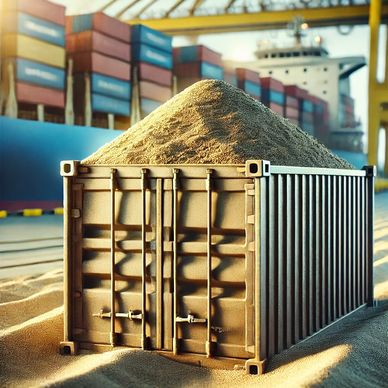Global Exporter
Sand
Gypsum Powder (POP)
Gypsum Powder (POP)

Sand is one of the most consumed resources on the planet, crucial for concrete production, glass manufacturing, and even land reclamation. Features and Uses: Its coarse, granular composition provides the bulk and strength in building materials. Export/Import Dynamics: Australia is a leading exporter, supplying countries like Singapore, which relies heavily on imported sand for its extensive land reclamation efforts.
Gypsum Powder (POP)
Gypsum Powder (POP)
Gypsum Powder (POP)

Gypsum powder is a versatile material predominantly used in the construction industry for manufacturing plaster, plasterboard, and other decorative elements. Its utility extends to agriculture as a soil conditioner and in the food industry as a tofu coagulant. Features and Uses: It serves as an essential fire-resistant building material, offers sound insulation, and provides aesthetic texture to interiors. Gypsum is used as a hardening retarder in Portland cement and is crucial for decorative moldings. Export/Import Dynamics: Predominantly exported from countries rich in natural gypsum mineral resources like India and Turkey, it is imported by construction-booming nations such as the USA, Canada, and across Europe, where stringent building codes drive its demand.
Granite
Gypsum Powder (POP)
Polycarbonate Sheets

Granite is a luxury building material known for its aesthetic appeal and durability, making it a preferred choice for countertops, flooring, and external facades in upscale construction. Features and Uses: Resistant to abrasion, weather, and acids, granite offers a long-lasting, maintenance-free surface. Export/Import Dynamics: Quarried in India and Brazil, granite is exported worldwide, with the USA and European countries being prominent markets due to their high demand for quality building materials.
Polycarbonate Sheets
Polycarbonate Sheets
Polycarbonate Sheets

Polycarbonate sheets are a high-performance thermoplastic known for their durability, clarity, and versatility. Made from polycarbonate polymer, these sheets are remarkably strong and impact-resistant, up to 250 times stronger than glass. They offer excellent optical clarity and are resistant to UV radiation, making them suitable for both indoor and outdoor applications. Lightweight yet robust, polycarbonate sheets are easy to handle, fabricate, and install.
Their applications span various industries: in construction, they are used for skylights, roofing, and greenhouses; in signage, they provide clarity and protection; in automotive and aerospace, they serve as windows and light covers; and in safety, they act as security glazing and protective shields.
Globally, key exporting countries include Germany, the U.S., Japan, and China, known for their advanced manufacturing. Major importing countries are India, Brazil, Australia, and the UAE, reflecting the sheets' widespread use and demand.
PVC Pipes
Polycarbonate Sheets
Slate Tiles

PVC (Polyvinyl Chloride) pipes are a popular choice for various piping applications due to their durability, versatility, and cost-effectiveness. Made from a synthetic plastic polymer, PVC pipes are resistant to corrosion, chemicals, and environmental factors, making them ideal for numerous uses.
These pipes are lightweight and easy to handle, which simplifies transportation and installation. They offer excellent resistance to weather and chemical reactions, ensuring a long lifespan with minimal maintenance. PVC pipes are also known for their smooth internal surface, which reduces friction and prevents the build-up of deposits, leading to efficient fluid flow.
PVC pipes are widely used in construction for water supply systems, drainage, and irrigation. They are also used in industrial applications for transporting chemicals and other fluids. Additionally, their affordability and ease of installation make them a common choice for residential plumbing systems.
In terms of global trade, key exporting countries include China, the United States, and Germany, known for their extensive production capabilities. Major importing countries are India, Brazil, and the United Arab Emirates, reflecting the global demand for PVC pipes in various sectors.
Slate Tiles
Polycarbonate Sheets
Slate Tiles

Slate tiles are a natural stone product valued for their durability, aesthetic appeal, and versatility. Formed from metamorphic rock, slate tiles are known for their ability to resist wear and tear, making them a popular choice for flooring, roofing, and wall cladding.
The natural composition of slate provides a unique texture and color variation, which can enhance the visual appeal of any space. Slate tiles are available in a range of colors, including greys, blacks, blues, and greens, offering flexibility in design.
Their durability is one of their key features. Slate tiles are resistant to scratches, stains, and moisture, making them suitable for high-traffic areas and various environmental conditions. They also offer excellent thermal insulation, helping to regulate indoor temperatures.
Slate tiles are commonly used in both residential and commercial applications. In homes, they are often used for flooring, backsplashes, and countertops. In commercial settings, they can be seen in high-traffic areas such as entryways and hallways. Additionally, slate is popular for roofing due to its longevity and resistance to weathering.
Globally, slate tiles are exported by countries such as Spain, India, and China, which are known for their rich deposits of high-quality slate. Major importing countries include the United States, the United Kingdom, and Germany, where slate tiles are used extensively in construction and renovation projects.
Copyright © 2024 Globiara - All Rights Reserved.